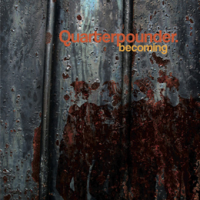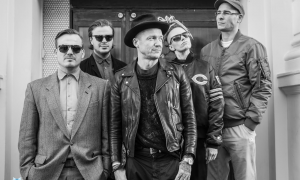Home » Jazz Articles » Live Review » Punkt 2012: Kristiansand, Norway, September 6-8, 2012
Punkt 2012: Kristiansand, Norway, September 6-8, 2012
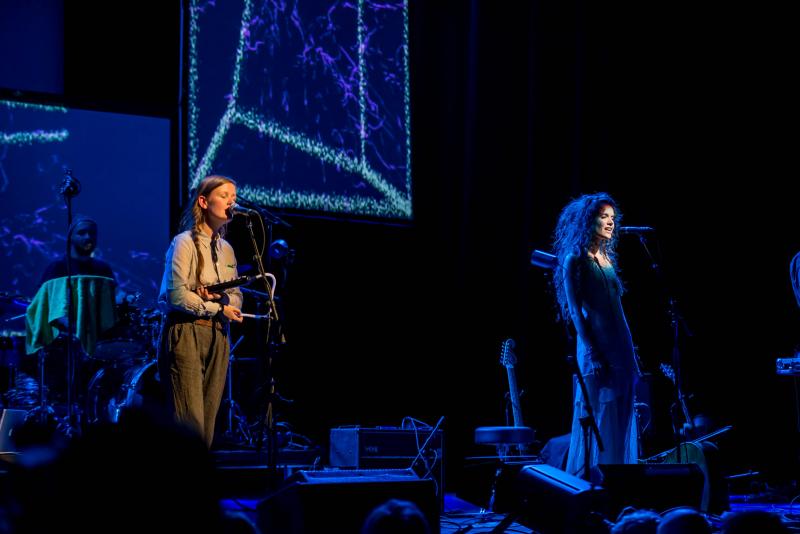
A little bit of Björk, a tad more of Sigur Rós and a whole lot more of something else more direct and melodic is the easiest way to describe Iceland's múm. That the band has been together for 15 years in some form or another is a little hard to believe, given its youthful appearance. While its first full-length record, 2000's Yesterday Was Dramatic—Today is OK (TMT/Thule), was a largely instrumental excursion informed by groups like Aphex Twin, the group that performed at Punkt was more song- and lyric-based, and if the septet's tendency was towards slow tempos, it was as self- effacing as Three Trapped Tigers when, after the first song, guitarist/keyboardist/vocalist Gunnar Örn Tynes introduced the set, quipping, "We're going to play all our songs extra fast."
Instrumentally diverse—along with various acoustic and electric guitars, piano, keyboards and electronics, the group featured cello, ukulele and melodica—müm, in the most unassuming way possible, delivered one of the festival's most idiosyncratic sets. With a combination of dry humor, tempos that ran from a virtual crawl to medium, and pulse-driven without ever being too obvious, müm's combination of quirky vocals, folk- driven instrumentation and contemporary sonics was a real winner.
September 5 Live Remix: Vladislav Delay
For the final remix of the day, Finland's Vladislav Delay (aka Sasu Ripatti) did a terrific job reinterpreting elements of müm's set, in a manner both denser and considerably more foreboding. If there were any complaints, it was the lack of interaction with anyone else, and a remix that, at nearly 40 minutes, went on a little bit too long.
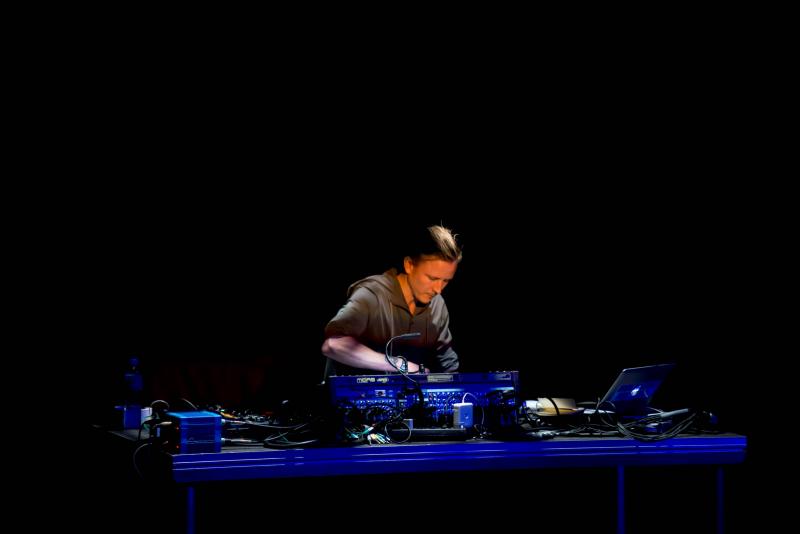
Still, beyond Bang, Honoré and Schwalm, it's clear that Delay—one of a number of musical noms de plume Ripatti uses, depending on the musical emphasis— represented less rhythmic, more experimental territory than his more dance floor-ready efforts as Uusitalo or Luomo. One of the earmarks of the electronic musicians performing at Punkt 2012 was Eno's undeniable seminal influence, but what was equally clear was how each of them had moved on to create personal spaces. There were trace elements of Eno's Apollo: Atmospheres and Soundtracks (Astalwerks, 1983), but largely subsumed into Delay's harsher, more brooding sonics.
While the lighting in the Alfaroom was intentionally minimal—the point was, after all, not to consider this as a performance—there was still very effective use of spare lighting throughout the weekend, in Delay's case a bar of soft light that started below his table and rose, gradually, to face level, only to drop and begin the rise again. It was spare but effective in an unobtrusive, almost subconscious fashion.
If Delay's other work is more rhythm-based, that didn't mean there weren't occasional pulses to be found here—albeit staggered and jagged. A low-end pulse emerged towards the end of the remix, which Delay slowly began to spread out with unpredictable rests, until the Björk-like voice of müm's cellist, Serena Tideman, was brought in to move this episodic remix to its conclusion.
September 6 Afternoon Concert: Aagre / Honoré Year of the Bullet
A morning boat ride to the home of a local baker, who put on a terrific spread of seafood soup, smoked salmon, macaroons and muffins—and, of course, the prerequisite beer and wine—was the premise for the annual Saturday morning hang that has always helped to foster the transparency of Punkt, with musicians, media and others getting the chance to see a bit of the surrounding area, relaxing and getting to know each other better. The only prerequisite for many attending was, however, that it would be possible to return to Kilden for the 1:00 p.m. concert by Erik Honoré and his partner, singer Greta Aagre, celebrating the release of Year of the Bullet. With two of the album's primary participants in tow—guitarist Bjørn Charles Dreyer and bassist Snorre Kiil Saga, the quartet also took advantage of the presence of Arve Henriksen (who guests on the recording as well), to flesh things out to a quintet, which faithfully delivered a good chunk of the recording to an appreciative crowd in the Alfaroom.
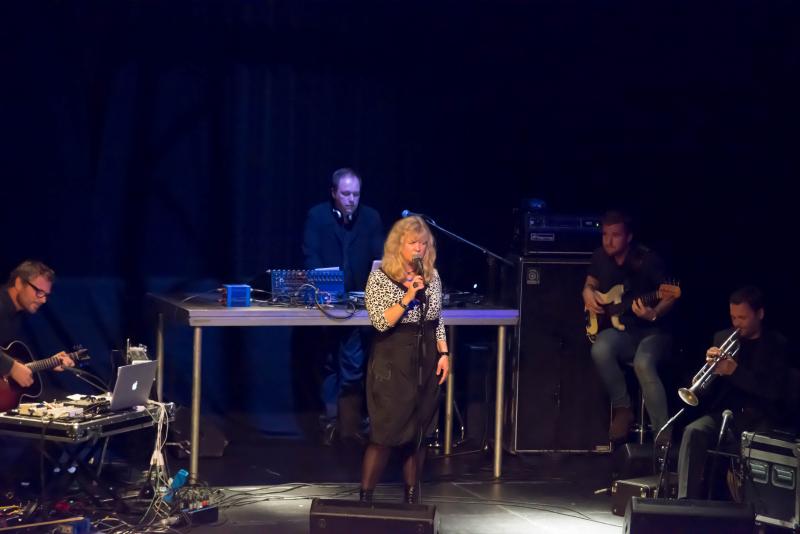
Oftentimes dark, the performance was, as on record, a reflection of Aagre's warm, soft- spoken voice—fragile but, at times, capable of greater power, and a welcome, mature contrast to the younger singers that dominate the market. Honoré's electronic landscapes combined with folkloric elements, in particular when Dreyer moved to acoustic guitar. Henriksen's painfully lyrical horn was another constant throughout the set, but what was perhaps most impressive was how the group managed to evoke the album's gentle quietude in a live context. All too often the nervous energy of live performance means more physical energy, and what Year of the Bullet—an Italian expression describing the years of violence and terrorism in the 1970s, and the title of a film by German director Magarethe von Trotta, dealing with those times— needed was to be as atmospheric, unhurried and calm as the recording. Aagre and Honoré accomplished this to perfection, for an afternoon performance that was like a soft oasis in the darkened Alfaroom, as more hustle and bustle took place around it in the rest of the Kilden Performing Arts Centre.
September 6 Concert: Ben Frost
The final evening for Punkt 2012 opened with what was certainly the loudest show of the festival—and likely the loudest Kilden has seen in the few short months since opening earlier this year. Ben Frost has made a name for himself as an artist of extremes: harsh, Trent Reznor-like guitar noise mixed with dulcimers and softer electronic textures as informed by classical minimalism—and even Estonian composer Arvo Pärt's tintinnabulation—as he is more industrial sounds and noise improv. For his Punkt performance, Frost collaborated with müm's Serena Tideman—though, in truth, his overwhelming walls of sound largely overpowered the cellist, whose harmonics and occasional extreme bowing was often lost in the mix.
Frost's use of natural sounds—orcas singing, wolves howling, walruses gruffing and glaciers breaking—mirrored environmental music that's been issued under the banner of New Age music for decades, but what Frost did was the antithesis of that easy-on-the- ears wallpaper music, though occasional moments of beauty did surface, only to blend back into the denser audioscapes. Even as he periodically strapped on a guitar to create massive sounds that were hard to identify as coming from the instrument, were it not for the four large amplifiers through which he was feeding it, the 50-minute set was a strange confluence of contrasts. Performing music from By the Throat (Bedroom Community, 2009) but to far greater extremes, Frost's music built to nearly ear-shattering volumes, with massive bass beats thundering from Kilden's huge PA system. It was a bold and dramatic set that may have left some of the audience gasping for air, but was powerful, effective and the first of two festival highlights on its final evening.
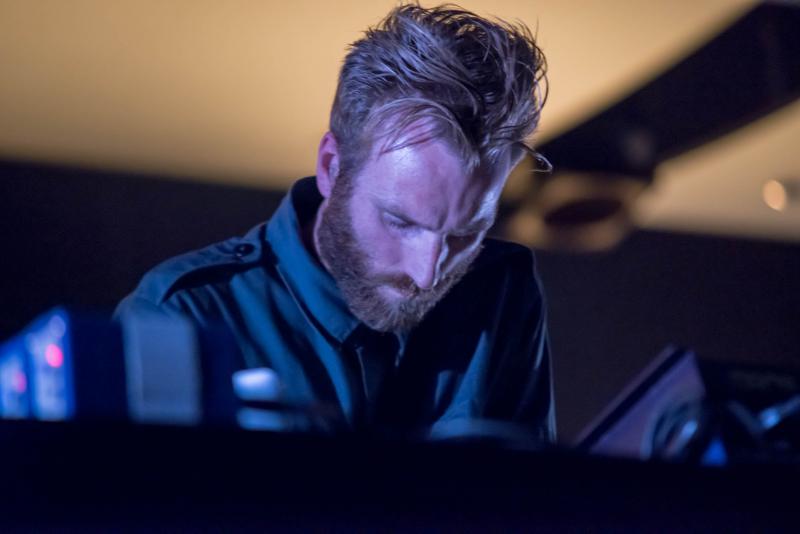
It was also a case of technology working to great advantage. Beyond the laptop situated on a table stage center—and with the sound reflectors on the roof of the stage brought down to just a couple feet above Frost's head, creating an almost claustrophobic stage design which was barely lit—Frost used an iPad, when he moved over to an upright piano, to control the other soundscapes, making it a largely one-man show, with only the occasional audible interjections from Tideland.
September 6 Live Remix: J. Peter Schwalm
J. Peter Schwalm's final remix—his participation on each night changing the dynamic of a festival which, in past years, was dominated by Bang and Honoré (who, with just two remixes and the Year of the Bullet afternoon performance, could actually go to shows, hang out in the halls and experience Punkt the way their audiences have)— was clearly a challenge. Beyond the sheer amount of information coming at him from Frost's performance, he only received a two-channel stereo mix— quite uncharacteristic, given that performances are usually fed to the Alfaroom in greater multi- track form, allowing the remixer to more selectively pick and choose what's to be used for the remix.
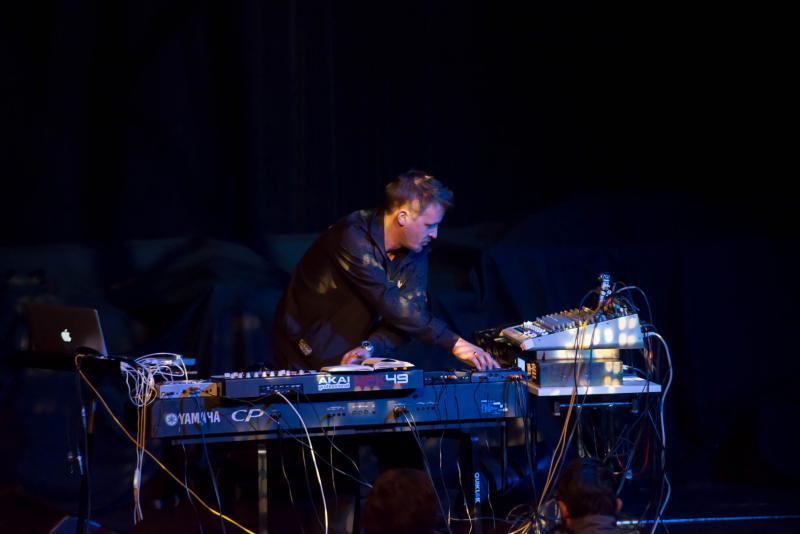
Still, it's a testament of Schwalm's own ears and creative mindset that he managed to expand upon aspects of Frost's thumping, low-end frequencies, adding his own acoustic piano samples and chordal washes. The most visible non-Norwegian at Punkt over the last couple years—also invited to Tallinn in 2011 and Mannheim in 2009—there's a reason why Bang and Honoré continue to enlist the German producer and remixer, who is currently readying an album for release in the coming months. Like his Norwegian counterparts, Schwalm knows how to build stories out of the raw materials he's given; he also knows when enough is enough, ending his Frost live remix after a scant 20 minutes. It was absolutely enough, and for all the best possible reasons.
September 6 Concert: Owen Pallett
Toronto, Canada-based Owen Pallett is, perhaps, better known for what he called his "day job" at the Punkt afterparty at K-35—the hangout for musicians and guests of the festival, where food and drink is on tap from early afternoon to well into the wee hours of the morning—playing violin on albums by everyone from R.E.M. and The Pet Shop Boys to Taylor Swift and the reunited Duran Duran, as well as ongoing membership in Canada's Arcade Fire. But it's the classically trained musician's own music that, no surprise, matters the most, even though he rarely gets to play it, these days, outside the context of impromptu shows in the Toronto area. His only self-released recording, Heartland (Self Produced, 2010), leverages a greater instrumental, well, palette, than his trio-driven Punkt performance, with Pallett playing various keyboards in addition to the strings, and inviting a variety of guests to add everything from electric guitar, cello and marimba to electric piano and timpani.
For his Punkt performance, he brought two longtime friends and musical collaborators, drummer Rob Gordon and low guitarist Matt Smith. Performing songs from Heartland and others, what Pallett lacked in orchestration he made up for in energy and sheer virtuosity. And while he may not have had quite the instrumental arsenal at his disposal, between his keyboard and almost mindboggling looping with his violin, he managed to create some seriously joyous noise.
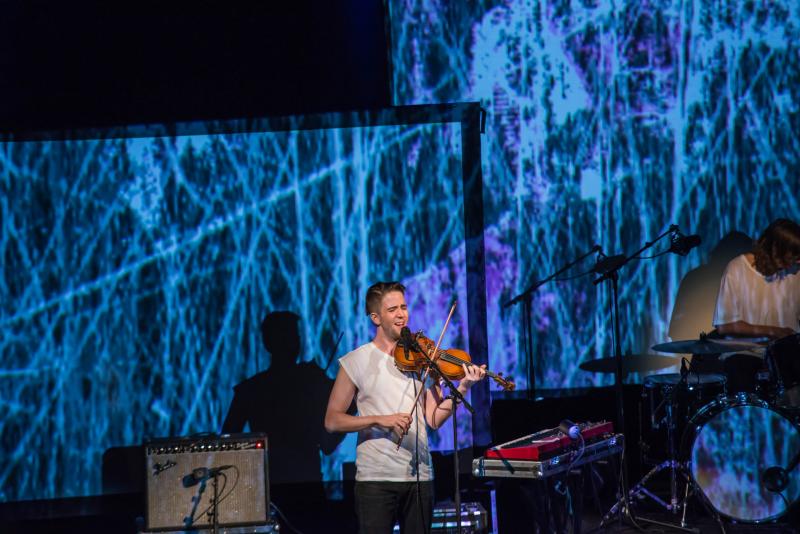
Not at all like Sweet Billy Pilgrim—but not completely unlike the British band either— Pallett makes a similar kind of intelligent person's pop music, filled with detail and complexity, while remaining effervescently catchy and lyrically curious. There was even one song that, after announcing the group was going to "give it a go," required a second kick-start, as Pallett's frighteningly fast keyboard line got out of synch with Gordon's drumming (or was it the other way around?); still, it was to Pallett's credit as an affable stage presence—even if not exactly relaxed (he was too energetic)—that he felt comfortable enough to not only try something he wasn't sure they'd managed, but try it a second time, to see if they could get it right. They did.
September 6 Live Remix: Bang / Honoré / Henriksen / Aarset
For the second remix by the Norwegian contingent, Bang, Honoré, Henriksen and Aarset took Pallett's music to an overall darker place. But that shouldn't suggest a lack of levity amongst these longtime musical and otherwise friends—especially with the puckish trumpeter onstage. Partway through the relatively brief remix, a cell-phone went off in the audience, prompting Henriksen to bend down and speak gently into his microphone, "Owen? Owen? Is that you? " With so many artists becoming increasingly sensitive to this kind of occurrence, Henriksen demonstrated an alternative approach: rather than be annoyed, make something out of it; use it.
In addition to his standard trumpet, Henriksen also brought out his saxophone mouthpiece to convert it into trumpophone—one of a number of odd Norwegian hybrids that also include Hakon Kornstad's flutonette (flute with a clarinet mouthpiece), and Trygve Seim's clarophone (a saxophone with a clarinet mouthpiece). Aarset, who has been leaning more towards guitar-like sounds recently, as opposed to the often unrecognizable sonics of years past, worked in concert with Henriksen to bring melodic space to the remix. Honoré was his usual statue-like self, while Bang moved to an internal rhythm when there wasn't an overt one to be found. It was a short but perfect remix that demonstrated the vernacular these players have built, and why it was essential to have them participating in at least some of this year's events.
September 6 Concert: Guimba Kouyaté
Before Malian guitarist Guimba Kouyaté took the main theater stage for the last performance of Punkt 2012, Fiona Talkington came onstage (complete with unexpected and artificially reddened trousers, thanks to some surgically precise lighting by the ever- mischievous Tord Knutsen) to do her usual (but never perfunctory) round of thanks—to the festival volunteers; to, in this case, Brian Eno; to the sound and lighting engineers; and, perhaps most importantly, to the audience, which truly makes Punkt a special place that encourages people to return year after year, even from distant places like Canada, the United States, Germany, England, Italy and Estonia. A festival like this could only happen in a town like Kristiansand, and beyond the international attendees, there's local and regional support—moral and financial—that's particularly significant for a festival as left-of-center as Punkt.
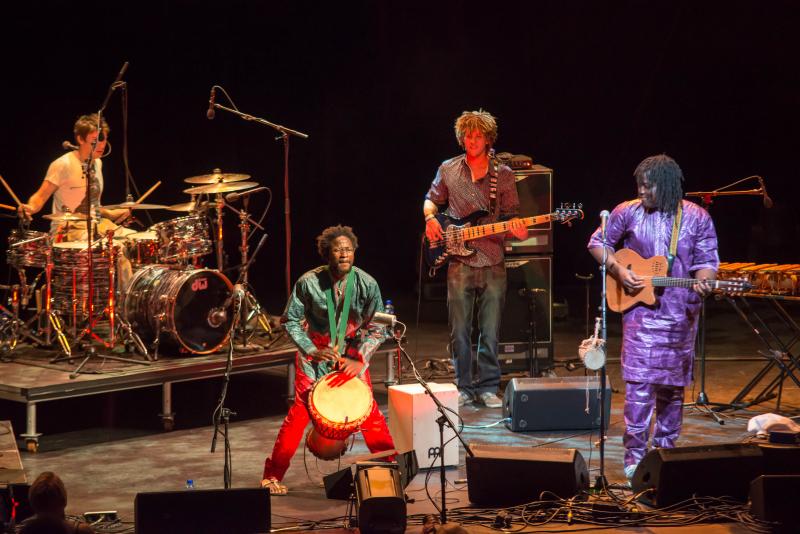
But, as ever, special thanks were due to Jan Bang and Erik Honoré, without whom Punkt would never have come to be, and could not continue to take place. The two Artistic Directors always receive a healthy round of applause, but what happened in Kilden was unprecedented: a spontaneous, instantaneous standing ovation that went on for a long, long time. Too bad Bang was in the Green Room and Honoré somewhere else, entering the hall just seconds after everyone had taken their seats; still, with much of the festival being filmed this year, there'll be some footage they can view afterwards, in order to see just how much their ongoing work is appreciated.
Eno first saw Kouyaté in a London club backing up the guitarist's mother, a more famous Malian singer. The guitarist played a brief solo spot which so captivated Eno that, when he was putting together the program for Punkt, as the story goes, he reached out to Kouyaté, asking him to perform. Humble as ever, the guitarist thought Eno meant he wanted his mother to appear, and when it became clear he wanted otherwise, he put together his first group, for its first-ever gig. While there might have been better, more seasoned acts to bring from the West African country, Kouyaté delivered a performance heavy on groove, entertainment, and some undeniably fine guitar fireworks. Playing a nylon-string electric—fed through wah wah pedal and distortion at times—as well as the four-string Djele N'Goni and, for one tune, talking drum, Kouyaté's music was easy on the ears and eminently danceable; at one point, with much of the audience on its feet, even the generally reserved Eno could be seen clapping his hands and swaying to Kouyaté's propulsive rhythms.
And it was a show, though his balafonist/percussionist's call-and-response— first with Kouyaté and then the audience—was terrific the first time but a little worn the second go 'round. But these are things Kouyaté will, no doubt, hone over time, if the group—which also featured an electric bassist (the son, apparently, of well-known bassist Etienne M'Bappe, currently a member of guitarist John McLaughlin's Fourth Dimension), kit drummer and keyboardist/flautist—gets the chance to stay together and put a few more gigs under its belt. Clearly Kouyaté has something special to offer, but he needs a little more time to find out how to best deliver it. In the meantime, he still managed to captivate the Punkt audience—and, if his show proved anything, it was that this year's festival stretched its stylistic purview further than ever before. If Bang and Honoré can carry some of that forward into Punkt 2013, then the festival's continued growth and evolution will be more than safely assured.
Wrap-Up
And so, another year, another Punkt. Three days after it began, there were a number of conclusions. Eno's curation may have been a mixed bag, but of his nine main theater shows, five were exceptional, two were plenty fine, and only two were, perhaps, less than successful. The live remixes were equally inconsistent, and could have used the touch of additional musicians thrown in to the mix. And if there were any fears that Punkt's move to the Kilden Performing Arts Centre would compromise its intimacy, they were allayed quickly in the larger but still somehow warm and comfy main hall, while the Alfaroom, despite being in need of some adjustments, still managed to work fine as well.

The importance of Kristiansand cannot be overstated in the success of any year's Punkt festival. Punkt has become a moveable feast that can be taken anywhere but, as good as its occasional road trips have been, there's something special about its annual home base edition. With roughly 80,000 people in the area, Kristiansand is not a big place, but it has the cultural awareness of a much larger city—the building of Kilden, and the municipality's Kultiva—a funding program for the arts that would be unheard of in a large North American city, let alone a town that, across the ocean, might be lucky to have a cinema- -being two significant examples. That Punkt has managed to engage local sponsors to the extent it has only speaks to awareness, amongst the town's population, of the importance of the arts in the daily fabric of life; quite simply, the degree of support that this experimental festival garners speaks volumes about the town itself.
As the days begin to get shorter in Norway and the weather turns a little cooler, this picturesque town at the southernmost tip of Norway is a particularly beautiful place to hold a festival like Punkt. Where, exactly, the festival will go next year is anybody's guess; but despite the somewhat mixed nature of this year's edition, it cannot be considered anything but a success.
Photo Credit
All Photos: John Kelman
Tags
punkt festival
Live Reviews
John Kelman
Norway
Jan Bang
Bill Bruford
Michiel Borstlap
Sweet Billy Pilgrim
Jon Hassell
Arve Henriksen
Nik Bartsch
Sidsel Endresen
Maja Ratkje
David Sylvian
Butch Morris
Brian Eno
Eivind Aarset
Bobby McFerrin
Robert Fripp
Hakon Kornstad
Trygve Seim
john mclaughlin
PREVIOUS / NEXT
Support All About Jazz
 All About Jazz has been a pillar of jazz since 1995, championing it as an art form and, more importantly, supporting the musicians who make it. Our enduring commitment has made "AAJ" one of the most culturally important websites of its kind, read by hundreds of thousands of fans, musicians and industry figures every month.
All About Jazz has been a pillar of jazz since 1995, championing it as an art form and, more importantly, supporting the musicians who make it. Our enduring commitment has made "AAJ" one of the most culturally important websites of its kind, read by hundreds of thousands of fans, musicians and industry figures every month.


